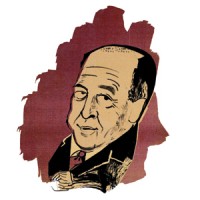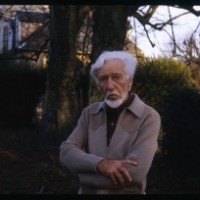Underrated: C.S. Lewis, by Judith Wolfe
Children’s books and popular presentations of Christian belief are what C.S. Lewis, who died 50 years ago this month, is best known for. But what makes him a favourite for earnest Christians’ christening and confirmation gifts — undaunted supernaturalism and doctrinal conservatism combined with an enticing rhetoric of certitude — makes him distasteful and a little suspicious to us intellectuals: “Mr Lewis is always clever” is the usual snub in Oxford Senior Common Rooms.
A.N. Wilson, in what is still the most widely read biography of Lewis, tries to dispel the magic by meticulously mapping Lewis’s intellectual development onto a well-worn Freudian chart of childhood trauma, repressed sexuality and frustrated ambition. But the diagnoses don’t really stick. There is no doubt, for example, that his mother’s death from cancer when he was nine left an indelible mark on Lewis’s psyche and imagination; but his responses to this and other blows were never obvious or merely reflexive. Indeed, one of the things that make Lewis remarkable is that, exactly contrary to Wilson, he never allowed experiences to become determining causes of his actions or convictions, but actively took hold of them as occasions for learning and, not least, self-questioning. The outcomes of such reflection were often unexpected, and Lewis accepted their consequences with uncompromising honesty.
One such conclusion was his conversion. The deaths first of his mother and then of his friends on the battlefields of the Great War aroused in the aspiring young poet a deeply felt and perfectly commonplace rage against a tyrannical God: “Come let us curse our Master ere we die, / For all our hopes in endless ruin lie. / The good is dead. Let us curse God most High,” Lewis wrote in his cycle of war poems, Spirits in Bondage, with all the consternation of Wilfred Owen or A.E. Housman. But probing further, he realised that it didn’t work — not because his protest was ineffectual but because it was incoherent. Richard Dawkins captures the reason well. When, at a 2012 podium discussion between Dawkins and Rowan Williams, an audience member asked tremulously what to make of the tragedy of an innocent child’s death, Dawkins shrugged that he could see here no puzzle or tragedy, but only an instance (sad perhaps for the mother, but unremarkable in itself) of the evolutionary principle of natural selection. Lewis came to the same conclusion: without God, there is no problem of evil. We may certainly ask, “If God exists, why does he allow evil?” — but we cannot answer that there is no God, or that he is a “brute and blackguard” morally inferior to any ordinary human, without also giving up our own sense of the outrage of evil. For if there is a creator God at all, then human reason, desire and moral intuition have their source in Him no less than the material world does; and if there isn’t, then any moral standard available to us can only derive from the same material processes that govern evolution, and so cannot ground the sort of outrage at the world’s futility that is irreducibly experienced as unconditional and absolute rather than merely relative and practical.
Read the complete article in Standpoint
Bertrand de Jouvenel: Forgotten Conservative, by Bruce Frohnen
In the disaster for humanity that was the 20th Century, dominated by the murderous dreams of collectivist ideologies and the unrestrained lust for power and the knife, those who loved liberty, be they conservative, libertarian, or “classical liberal,” recognized their common cause: opposition to ever-expanding state power. T.S. Eliot, Christopher Dawson, and Russell Kirk sought to redeem the time through recovery of our understanding of the spiritual bases of culture, and the cultural bases of ordered liberty. They were joined, in the economic sphere, by the likes of Wilhelm Roepke, but also by more secularist, market-centric thinkers like F.A. Hayek, who warned of the false appeal and disastrous consequences of following the Road to Serfdom. Yet, this sometimes uneasy partnership of defenders of cultural renewal and economic liberty included figures who sought to bridge the gap between cultural and economic thought. Such a one was Bertrand de Jouvenel, a conservative political thinker of great importance, whose writings from the middle to the second half of the 20th century deserve a wider audience than they receive.
In important works of political thought, including Sovereignty, On Power, and The Pure Theory of Politics, and also in works and essays dealing with economics and questions of how best to approach problems of public policy, Jouvenel made clear the tendency of the modern state to swallow the rest of society, and the individual with it. Ironically, Jouvenel observed, what made the state so dangerous in modern times was precisely what to most people gave to it its legitimacy: democracy. To many, this recognition of the dark side of democracy rendered Jouvenel’s thought suspect, at best. But his point was not that rule by consent is intrinsically wrong or unjust. Rather, it was that we should recognize the proper limits even of the people to act according to their will, and that such recognition is all the more important in democratic times. From recognition of the importance of the consent of the governed, modern democracy moved to the assumption that governments are legitimate to the extent that they serve the unmediated will of the majority led. Relatively early on, this overemphasis on the normative status of The People (too often little more than an abstraction) led to the common assumption that whatever a democratically elected government did was, by definition, right and just. One need only consider the French Revolutionary Reign of Terror and its claim to act for the people to see the wisdom of Jouvenel’s warning.
In a collection of lectures published as The Ethics of Redistribution, Jouvenel showed how false belief in the power of the majority to achieve a just, fair, and (especially) equal society could succeed only in feeding the Minotaur—that monstrous combination of man and beast that the modern state had become. Thinking, wrongly, that the rich had kept for themselves sufficient wealth to satisfy the needs of all, the people for generations have voted for governmental policies aimed at “redistributing” that wealth so as to meet the needs of the poor. Unfortunately, Jouvenel points out, even if one were able to confiscate all the rich had in their possession, the sum would not come close to meeting the needs of even the poorest. Thus, Jouvenel argued, the wealth “transfer” had not been, and could not be, from the rich to the poor, but rather from most of society to the state. Various programs aimed, in theory, at enriching the lives of the poor would be funded from a general tax, taking money from most people so that the government might spend it on those it deemed worthy or in need. From attempting to provide subsistence to the hungry and the cold, the state quickly moved on to funding various ideological projects, including wasteful forms of subsidized insurance and educational programs and artistic endeavors of highly questionable value, as it built an expensive administrative apparatus to determine how much to give to whom. In this manner the state became increasingly powerful and independent of any check or oversight, even as it maintained the guise and the rhetoric of a mere servant of the people.
Read the complete article in The Imaginative Conservative
Why Vampires and Zombies are So Popular with Secular Humanists, by Timothy Gordon
The cultural phenomenon is undeniable: vampire and zombie phantasmagoria is in its heyday, especially among Gen-Xers and younger. The dis-ensouled human form, both the high (the vampire) and the low (the zombie), has swept the nation in movies, TV shows, books, graphic novels, and even spoofs. The vampire has become the golden boy for the New Humanism, the zombie its greatest scapegoat. From a religious point of view, these modern tales of alienation happen to tell far more about the soul of the culture which situates them than the lack of soul within the individual zombie or vampire.
First, a brief caveat: I disclaim no inherent immorality appurtenant to the consumption of this sub-genre. I’ve viewed some of these films myself, of course. Zomb and vamp flicks are not themselves immoral or perfidious. Rather, they reflect the abiding lack of morals and good faith–the nutritive supplements of the psyche–of the generation which authors and cherishes them. These creatures reflect the soullessness, in a word, of the culture that has embraced them.
In a secular age, a dis-ensouled human form like a zombie or a vampire becomes a natural item of fascination for the class of young, urban metrosexuals which has been immersed from the cradle in the day’s agnosticism (more pervasively than the older generations, who experience cultural apostasy as something of a sea change, even as they affirm it). Both the vampire and the zombie lack souls and, as such, seek constantly to fabricate existential meaning for their lives, ex nihilo. But the zombie does so in a flatly insufficient manner, seeking the taste of brains alone.
The irreligious youth recognizes the facially unfulfilling nature of the zombie’s quest and presupposes instead the veracity of the vampiric creed, out of hand: the “person” is seen no longer as composite body and soul, but rather as body alone; soulless, the individual is no longer directed toward anything; existence becomes painful loneliness, as love has become eros and no longer caritas. Genuine human communion is thus impossible; one creates one’s own private meaning. And meaning is most lucratively created when done at the expense of others, save for an arbitrarily chosen beloved, who is set aside as sacrosanct. The vampire’s otherwise Hobbesian modus operandi is suspended–without an articulable reason–for his beloved.
Unfortunately, I have just described the weekend mood of the average nightclub attendee, across this land.
Recall what Whitehead wrote about scrutinizing an epoch for its truest self: “look not to its suppositions, but to its presuppositions.” In short, stories of the vampire and of the zombie really represent the new, secular, anti-Aristotelian De Anima, both poles of the ontology of desultory soullessness. They constitute the secularist’s credo on the soul: the quandary arises on account of mankind’s lack thereof.
To a post-theistic generation and its cosmos, the vampire represents all that remains a secular desideratum, being “beyond good and evil,” physically virile yet delicate, outwardly attractive, atheistically immortal, intelligent without acknowledgement of the intelligible barriers to total behavioral license (except for an occasional moral whim). Androgynous and yet still anthropomorphically alluring, the “modern vampire” is the re-vamped (pun definitely intended) Nietzschean übermensch, a “brute, blonde, if pale, beast.” He can basically do as he pleases, act decently or not.
And yet, for all his attributes, still he skulks and ever wrings his hands. This is the secularist’s version of humility. The vampire has postmodern angst. He’s “emo.” In short, he is everything the secular humanists hold dear and have striven after for two centuries.
Okay, but then why the zombie? What has that rube got going for him? He has no existential inner conflict like the vampire. He’s not smart. He’s not handsome. He doesn’t attempt to nurture even the selfish, erotic love of the vampire.
Read the complete article in The Imaginative Conservative


